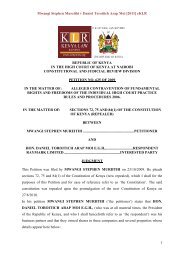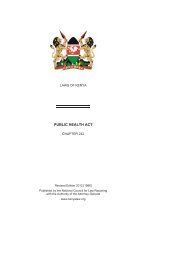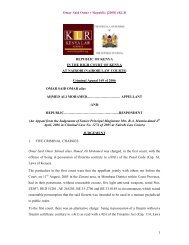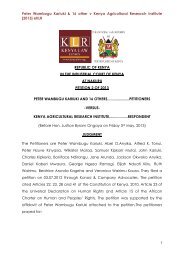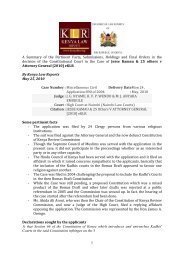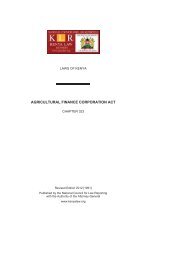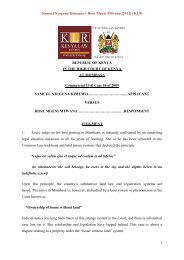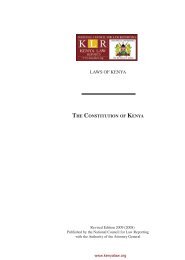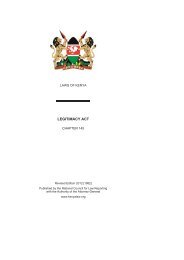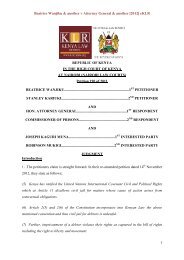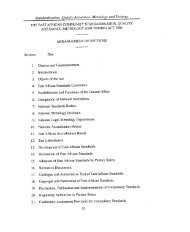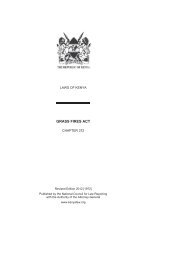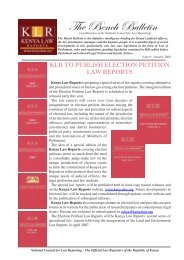Bench Bulletin - Issue 12 - Kenya Law Reports
Bench Bulletin - Issue 12 - Kenya Law Reports
Bench Bulletin - Issue 12 - Kenya Law Reports
You also want an ePaper? Increase the reach of your titles
YUMPU automatically turns print PDFs into web optimized ePapers that Google loves.
KENYA LAW REPORTS<br />
BENCH BULLETIN<br />
FROM THE COURTS — HIGH COURT<br />
establishes that the accused person’s were acting jointly and or on common design-malice aforethought-whether failure<br />
to prove motive vitiated an accused persons conviction-whether it was necessary to prove motive as one of the elements<br />
in a criminal offence-whether the prosecution discharged its onus of establishing a prima facie case against both accused<br />
persons-Penal Code (Cap 63) 9, section 203, 204,<br />
Criminal Practice and Procedure-witness-prosecution witness-prosecution failing to call the investigating officer as<br />
a witness in the trial-other witness categorically placing the accused at the crime scene-circumstances under which the<br />
evidence of the investigating officer would have been required-effect of failing to call the investigating officer-whether<br />
the lack of evidence left a gap in the prosecution’s evidence<br />
Criminal Practice and Procedure-defence-defence of alibi-accused person raising defence of alibi-accused claiming that<br />
the complainants had a grudge against him-viability of the defence-whether the defence was an afterthought<br />
The accused persons were arraigned<br />
before the High Court on an information<br />
charging them with murder contrary to<br />
section 203 as read with section 204 of<br />
the Penal Code (Cap 63). During the trial<br />
a total of nine witnesses testified for the<br />
prosecution. The evidence was that the<br />
accused person had been among a mob<br />
of people who had gone to the deceased’s<br />
home and inflicted fatal injuries on him<br />
allegedly because they suspected him<br />
of theft. Most of the witnesses testified<br />
to knowing both accused persons<br />
personally.<br />
A post-mortem examination of the<br />
deceased’s body, a report of which had been adduced in evidence, stated that the deceased had multiple bodily injuries<br />
and that he had suffered brain damage due to serious head injuries.<br />
In their defence the accused persons claimed not to have known the deceased. It had been their contention that they<br />
were not in the mob that attacked the deceased on the material day and further that the witnesses had a grudge against<br />
them.<br />
Held:<br />
1. Failure to prove motive did not, per se, vitiate an accused person’s conviction because under section 9 of the Penal<br />
Code motive was not one of the necessary elements to be proven in a criminal offence. However even if motive was<br />
necessary, it could be found in the evidence of the witnesses who apparently alongside the deceased, were allegedly<br />
being disciplined for having stolen.<br />
2. Where the case against two accused persons proceeded on the basis of their acting in concert then both could be<br />
found guilty, if the evidence established that they were acting jointly and or on common design. It did not matter that<br />
they were in an amorphous group. The deceased was a victim of their mob justice. The action of each of them during the<br />
execution of the mandate was the action of all others as it was in pursuance of a common purpose. The action herein<br />
of the accused was in furtherance of that common purpose and the action of each affected the other.<br />
3. There was no law to the effect that in every case the investigating officer had to testify. Such cases were confined to<br />
their peculiar facts and circumstances. In this case, the evidence of the investigating officer would have been necessary<br />
if there had been loose ends in the prosecution case that required tying up. There was no unbridgeable gap in the<br />
prosecution case that his/her evidence would have been of assistance.<br />
4. The accused person’s defence of alibi when juxtaposed against the overwhelming prosecution evidence failed to<br />
stand. The witnesses had no reason to have a grudge against the accused and the defence was a mere afterthought. It<br />
was the accused in the company of others who inflicted fatal injuries on the deceased that led to his subsequent death.<br />
They were properly and positively identified in the act by the witnesses. They knew that their actions would probably<br />
cause and indeed did cause the death of the deceased.<br />
Accused convicted<br />
Advocates<br />
Ms Mwai counsel for the accused<br />
Mr. Makura Senior State Counsel<br />
74



